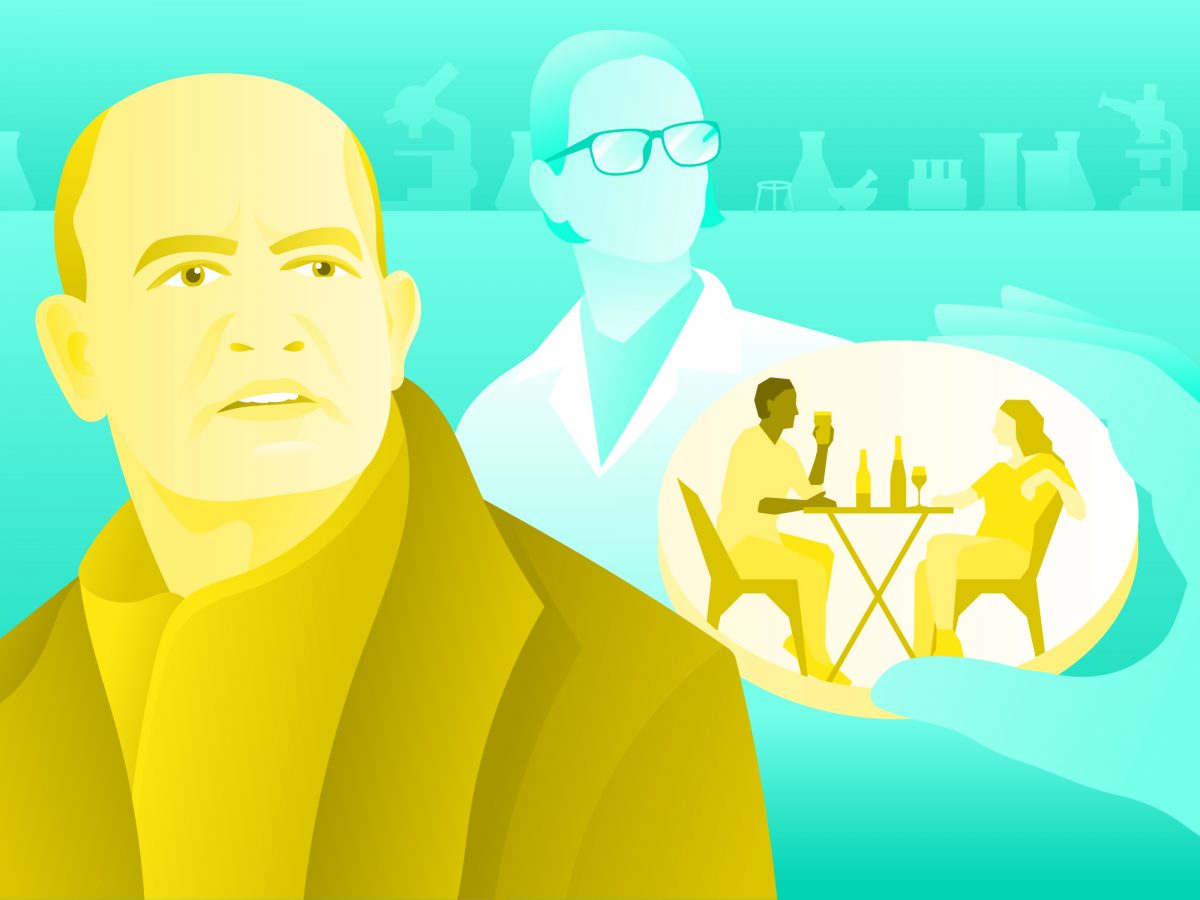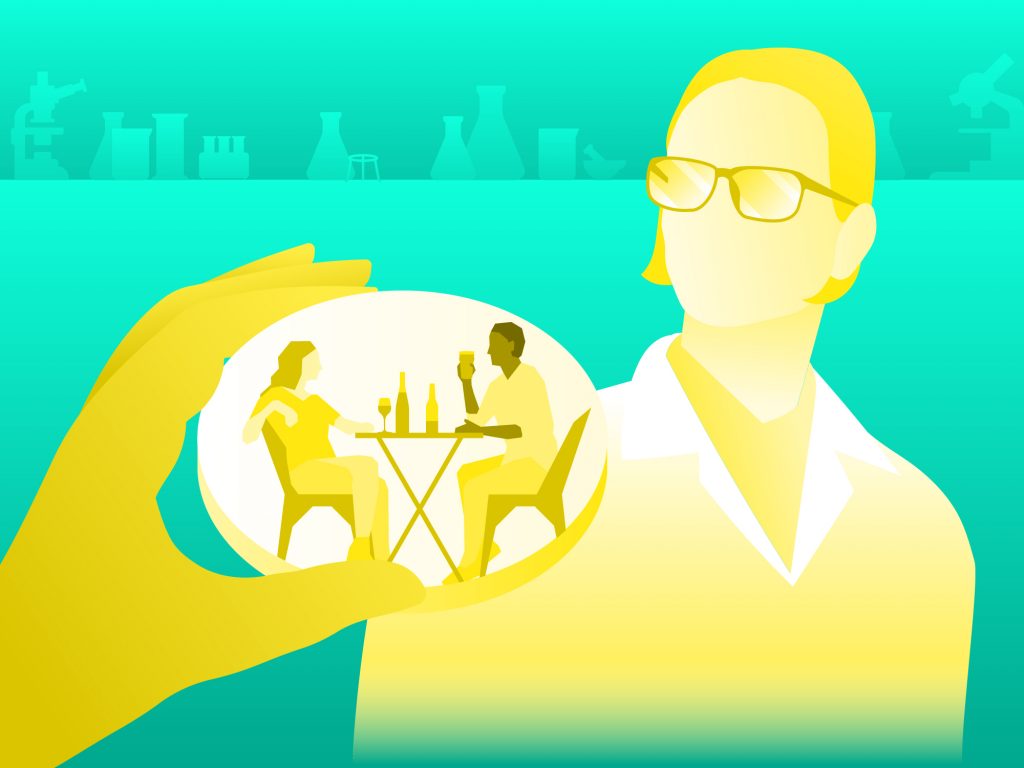
As part of Kaspersky’s Bring on the Future series, we meet businesses around the world who are changing their industry and society for the better.
Alcohol, or more importantly, ethanol, has been used globally for around 9,000 years, with the earliest moonshine traced back to ancient China. Why? Well, as many could probably attest to, it makes us feel good. And there’s scientific evidence behind that. At a basic level, alcohol helps us to connect and bond with others – a good thing. So why then, is it so inherently bad for us? From liver damage to broken bank balances – according to the World Health Organization, alcohol kills around three million people across the globe every year.
But what if there was a way of taking the good effects of alcohol and leaving behind the bad? Well, the solution may very nearly be here, and we have Alcarelle to thank for it. They’re working on an ingredient that they hope could mimic the effects of (at the most) two glasses of wine but without the health threats or hangovers. I talked to Alcarelle’s Managing Director, David Orren, to find out more.
Ryan Loftus: Alcarelle – how did it all start?
David Orren: David Nutt and I started Alcarelle in 2016. David had been working on a social drink alternative to alcohol; his goal for his whole career was to develop something that mimics the good feelings and positive socializing effects of an adult drink, without the adverse effects. But before we started Alcarelle, his ground-breaking scientific work was seen by some as an offensive against the alcohol industry.
Four years ago, when I came on board, David had established the foundation for research and identified several viable compounds. But his understanding of the regulatory environment and the general business side was limited. He’s a scientist and a very good one at that. My background is in business, supporting disruptive technologies that have the potential to make large-scale change. It’s hard to find those opportunities in your lifetime; meeting David, I knew this was one of those moments.
So, we decided together, four years ago, to start Alcarelle. And instead of taking on the alcohol industry, we set out to work with the industry, making an ingredient we can take to beverage companies to help them create better products and an alternative future. It was born out of a societal need, really. Alcoholism is a huge problem. But on the flip side, the positive effects of alcohol – notably on how we socialize – can be exponentially good for us as individuals and for making social connections. Therein lies the challenge.
You mention the “good” effects of alcohol, what do you mean specifically? And why do you think that’s important?
Back in 2012, Sayette et al. did an important study. They had three groups of people, one drinking a small amount of alcohol, one with a placebo – participants thought it was alcohol, but it wasn’t – and one with a soft drink. They set up their cameras to record how, or if, the groups connected when left alone in a room, using markers like smiling, retaining a gaze, or even awkward silences. There was a more positive connection between those drinking alcohol.
It’s no secret: when we drink alcohol, on the whole, we tend to relax. This study reinforces that idea, and that some of the effects of alcohol can be beneficial, most notably in helping us to connect with others, to relax, celebrate and to form a community. And it’s clear from ancient religions, including Christianity and Judaism, that alcohol has played an essential role in enabling people to come together to celebrate and mark important occasions. It’s embedded in our history.
At Alcarelle, this inspires us. If we can get this right, and find a balance with the right ingredients, there are no limits to where it could go. Or how beneficial it could be for society. We might be looking forward to a new generation of healthier drinks. Imagine that – it could potentially make going to a bar a healthier experience.
Ground-breaking! What’s the big vision?
To create an ingredient which could be offered to the drinks industry, for different brands to develop their own range of drinks. Four years ago, when we set out, people were asking, “Is this an alternative to beer or wine?” Back then, people mostly thought, “What is this like?” Today we’re past that. I see a new generation of exciting adult drinks. Granted, some might still use it to create an alternative to beer, but the possibilities are endless.
That’s not to say we’re against alcohol. We don’t want to tread on the toes of any fine wines, spirits, or beers. I continue to enjoy a beer or fine wine or single malt when the occasion suits. David and I are often to be found discussing the day’s work over refreshments at the London wine bar he co-owns with this daughter.
But the purpose of our work points towards a pleasant alternative future, which doesn’t encourage people to drink more or use the product as an alternative to getting drunk. Our big picture: we want to help other companies do the same thing. I think once we’re in the market, there will be a lot of innovation. We welcome that.
Getting to market is expensive and time-consuming. Hopefully, in the future, we’ll be able to use our research benchmarks – especially with things like compound development – to help innovators cut that time and expense. We want to become a collaboration partner for other companies, so the drinks industry flourishes.
A helping hand for the next generation. So to bring it back to the product, how does it affect you?

Firstly, and most importantly, our goal is to create an ingredient that will not get you “drunk.” The aim isn’t to get people to a point where they forget what happened the night before. It’s specifically intended to avoid that. Our work aims to produce a maximum effect equivalent to a glass or two of wine.
We’re aiming for a flat curve, which means if you continue you to drink, you shouldn’t feel any more effect. To be honest, this aspect of the scientific vision blew my socks off and is a testament to not only the curiosity and ingenuity of our team but also to the genius of nature and the enormous body of work from generations of scientists who preceded us.
Right on. So what stage of that journey are you at now?
After several years of investigating, synthesizing and testing high potential compounds, we’re now very close to a shortlist. We have several compounds that we’re excited about, and we’re hoping that by the end of 2019, we’ll have shortlisted those to three frontrunners. Then we’ll keep testing until we’re down to one. The next stage is even more expensive, so fundraising will be a big focus for us.
Right now, we’re introducing new scientists into our group and new ways of working. On a personal level, David and I are both very interested in the use of AI; I’m investigating how we might introduce it into two different streams of the research process: bioprospecting and behavioral understanding.
We’re research-focused – “science in nature” is a core value that defines who we are and where we want to go. It brings us together as a team, making us accountable for our end goal: using the lens of science to understand better one small aspect of nature – the effect of alcohol on the human body – that has the potential to improve many lives.
It seems like you’re making great progress. Have any health organizations validated your claims?
There are many health bodies, all over the world, and many different jurisdictions. We’ve had early conversations with regulatory specialists, which has been invaluable and helped to guide our compound testing. During 2020, we plan to move to the next stage and will need to cover significant costs to make progress with the regulators.
Very, very exciting. What challenges have you faced so far?
The biggest challenge today is finding the right investors to support our network. We expect to raise $25m to bring this to the market over the next three to five years. For many, not seeing a return on investment for that time can make us look very unattractive. From another perspective, if we’re successful and do reach market, there’s no limit to what could happen.
What’s been your most significant success?
The last four years have been a series of several steps forward, with one or two steps back, specifically in terms of the compounds we’ve investigated and others we’ve developed. We’re continually learning and expanding our team to include some incredible scientists and researchers, and now we’re looking into AI.
What does the future hold for Alcarelle?
Under our current strategy, and this comes down to testing and regulatory processes, we hope to be in the market within the next five years. We’re investigating a few things right now which might allow us to accelerate that timeframe, which is very exciting. Keep your eyes peeled!
Thanks for your time David, and good luck!



